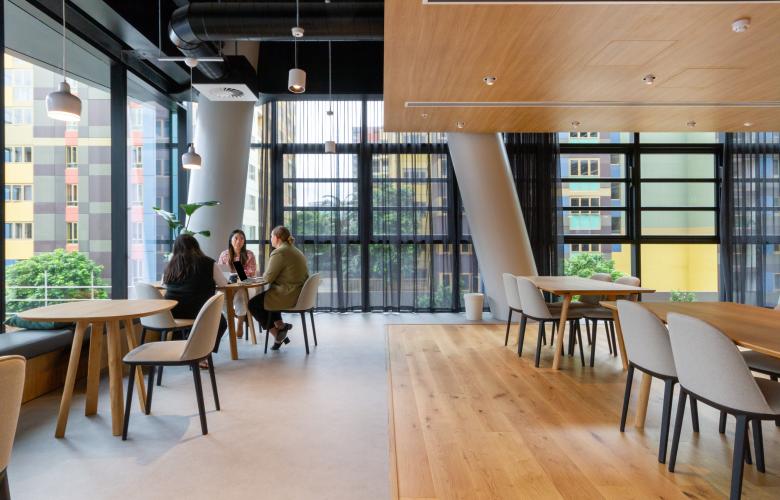What a connected office might look like in the future
Contact
What a connected office might look like in the future
Connectivity is at the heart of hybrid working. As hybrid evolves to meet the needs of the workforce, the workspace must evolve with it. So, what does the future hold for the connected office space?
Those with a stake in business property know how important it is to keep a finger on the pulse. Recent years have shown just how quickly business attitudes to what a workplace can and should be can change. The demand for hybrid working has echoed across the globe so loudly that the UK and other countries have introduced specific legislation giving employees the right to request flexible working for at least one day a week.
For landlords and franchise partners, moving with the times means tailoring their workspaces to the demands of the hybrid model. This has far-reaching implications for everything from location and surrounding amenities to digital infrastructure and connectivity.
It’s important to note that there are no one-size-fits-all solutions. Every franchise partner has their own learning curve that is informed by the specific needs of their business clients. Nonetheless, listening to industry experts can help proactive stakeholders to spot emerging trends and tailor their offerings accordingly.
With that in mind, here is what the experts believe landlords and franchise partners can expect more of in the future.
Satellites as well as city centres
The future of hybrid working is one where suburban satellite offices closer to residential areas offer alternatives to city-centre workspaces. Many landlords have already begun to adjust and expand their portfolios to encompass these increasingly desirable properties that are, quite literally, closer to home for many employees. As this becomes more commonplace, we can expect a proliferation of ‘15-minute cities’ as described by French academic Professor Carlos Moreno at the University of Paris.
Moreno envisions a world where employees can access not just their workplaces but shopping, entertainment, education and healthcare within a 15-minute walk of the home. Less working from home, and more working near home. This would potentially result in less stressful commuting, less urban traffic and fewer carbon emissions, benefitting people and the planet as well as the profits of both property stakeholders and their business clients.
An employee experience driven by proptech
Employee wellbeing is at the heart of the hybrid revolutions, and workspaces will need to factor this into everything from their decor to their digital infrastructures. We can expect workspaces to become more social and collaborative in nature, with a strong emphasis on flexibility. Spaces will be expected to serve multiple purposes, with less rigidity surrounding the function of different rooms.
Property technology (proptech) will be a huge driving force in delivering an employee experience where workers can interact meaningfully with their peers, whether they share the same physical space or not. Advanced video conferencing facilities are likely to become de-rigueur with ‘Zoom Rooms’ and Metaverse-ready spaces commonplace to facilitate collaboration between teams.
IoT-enabled devices and sensors will also be used to the benefit of employees, employers and property stakeholders. For instance, data from door count and desk sensors could be used to find optimal desk-to-person ratios. Likewise, employee experience platforms will empower employees to book meeting rooms, access locked spaces touch-free and even access third-party catering and retail systems from within a single app.
Space as a service with flexible solutions built around employee needs
We can expect lengthy and restrictive leases to become a thing of the past, as the national and global workforce move more emphatically towards the hybrid working model. In order to make their properties more appealing to enterprise clients, property stakeholders will adapt to a more on-demand approach that involves shorter and more flexible leases. Spaces will be adaptable and upgradable in accordance with the needs of the workforce.
Flexibility will not only be a key facet in how spaces are secured, but in how they are used as well. Solutions will be driven by the needs of employees, with business leaders and landlords working together to ensure that employees have everything they need to be at their best.
Dan Bladen, the co-founder of Kadance (formerly Chargifi), has developed a desk and room management platform designed specifically to suit the needs of a hybrid workforce. Neatly summing up the new way of work, he told IWG:
“I think we see two important trends: first employee autonomy, and second servant leadership […] The office now is no longer just a default place where you go to work, it is just another tool now that you can use for types of work, for example, collaboration and creativity, projects or kick-offs. Employees are not managed in terms of micro-management, and they are not forced to show up in certain areas – instead they are trusted to do their best work, wherever they are.”
The hybrid workplace is rich with exciting potential for landlords and franchise partners as well as the business clients and employees that use their spaces. Are you ready to meet tomorrow’s challenges? Find out how IWG can help you prepare your commercial property for a hybrid future.
Related Reading:
What do tenants want from the workspace of today?
Why Hybrid Clients Are Thinking Outside The Box
Current Work Trends : What Franchise Operators and Landlords Need To Know
Flexspace Benefits any Business... and any Property | Commo.
Current Work Trends : What Franchise Operators and Landlords Need To Know | Commo.
The Role of Franchise Operators and Landlords in the Future of Flexspace
Suburban rejuvenation. New places for workplaces. New opportunities for landlords.







